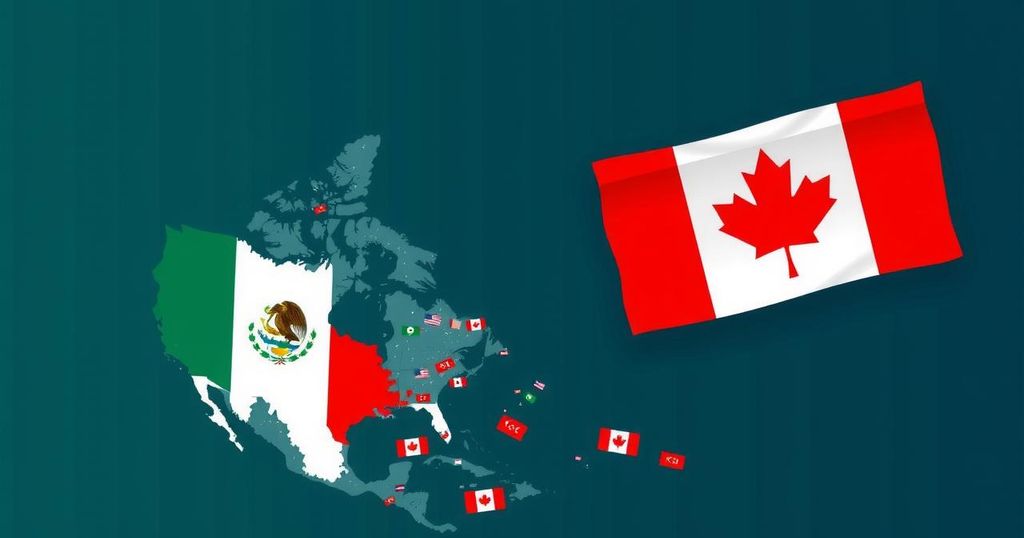President-elect Donald Trump’s proposed trade war with Mexico, China, and Canada may lead American companies to seek alternative manufacturing locations. While Vietnam is a strong prospect for relocation due to cost advantages, challenges like capacity constraints and rising costs could hinder its efficacy. Other sectors may see shifts towards European and Asian manufacturers, but many businesses may decide to absorb tariffs to avoid relocation costs.
President-elect Donald Trump has expressed intentions to initiate a trade conflict with Mexico, China, and Canada, potentially reshaping the landscape of American imports. These three nations accounted for over 40% of U.S. imports last year, which raises significant questions regarding where American businesses may relocate their production.
Trump’s proposed tariffs include a 10% increase on Chinese imports and a substantial 25% on goods from Mexico and Canada. His administration anticipates these tariffs will boost domestic manufacturing by incentivizing relocation to the United States through tax breaks. However, experts, including Daniel Anthony, have doubts about this strategy’s effectiveness, citing a lack of infrastructure and higher production costs as obstacles to a meaningful resurgence in domestic manufacturing.
As tariffs escalate, it is likely that companies will look to other nations to mitigate costs, with Vietnam emerging as a prominent candidate due to its affordable manufacturing environment. This country has seen its goods exports to the U.S. more than double from 2017 to 2023, indicating its growing importance. However, an influx of businesses to Vietnam could lead to increased production expenses over time, challenging its viability as a long-term manufacturing hub.
The automotive sector may also witness shifts, with European countries like Germany and manufacturers in Japan and South Korea poised to increase production in response to changes in U.S. tariffs on vehicle imports from Mexico.
In terms of apparel and footwear, Indonesia, Bangladesh, and Cambodia could offer alternatives for U.S. consumers. Additionally, Taiwan may ramp up its electronics production, seeking to capitalize on reduced imports from China due to tariff hikes. Yet, some industries may remain entrenched in China to avoid the transition costs associated with relocating.
Despite the looming threat of tariffs, many businesses may opt to stay put, focusing instead on minimizing total costs rather than relocating operations. Historical data shows that even significant tariffs on Chinese goods have not entirely curtailed imports; the U.S. continues to engage in trade with China, albeit at a reduced level.
In summary, while the prospect of a trade war prompts discussions surrounding the relocation of manufacturing, various factors, including operational costs, infrastructure capabilities, and existing contracts, will significantly influence corporate decisions regarding the movement of production facilities. Apprehensions about higher production costs and market demands will play a critical role in shaping the future of international trade relations.
The article discusses the potential consequences of heightened trade tensions initiated by President-elect Donald Trump, particularly aimed at Mexico, China, and Canada. It presents the challenge facing U.S. businesses as they explore alternative manufacturing locations if tariffs on imports from these countries increase. The text explores various nations that could be considered by U.S. companies seeking to avoid tariffs while assessing the practical implications of such relocations, including geopolitical relationships and current manufacturing capacities in those countries. The critical factors that influence these decisions, such as existing trade agreements and historical patterns in import-export behaviors, also form part of the discussion.
The anticipated trade confrontations proposed by President-elect Trump could significantly alter the landscape of American imports. While there is potential for businesses to relocate to countries like Vietnam, the practicality of such movements remains uncertain due to infrastructure limitations and rising costs. Furthermore, historical evidence suggests that companies may prefer to absorb tariffs rather than engage in the complex process of relocation. Overall, a nuanced understanding of the trade dynamics is essential to forecasting the impact of proposed tariffs on U.S. imports and manufacturing.
Original Source: www.cnn.com






